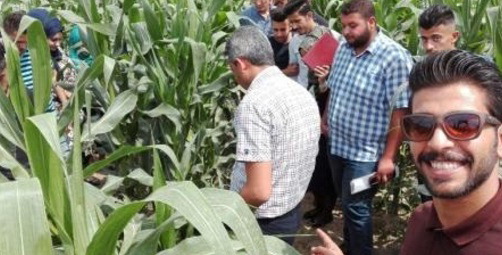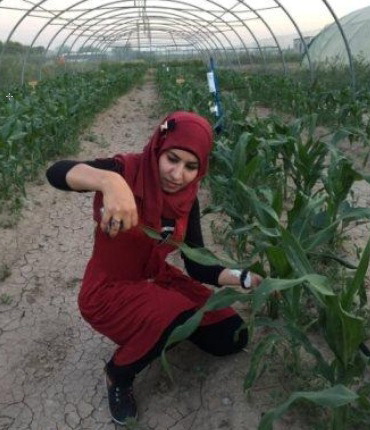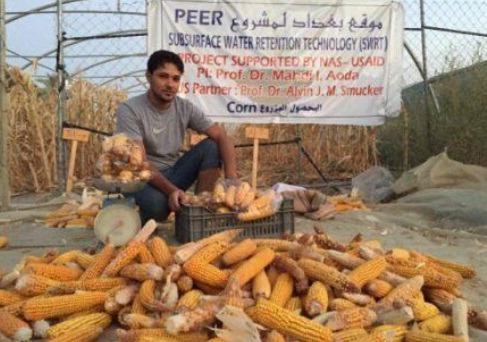Project Overview
Water scarcity is becoming more acute in Iraq, primarily due to the high evapo-transpiration rates and the fact that previous international water sources increasingly are being retained in large dams and canal systems in Syria and Turkey. Surface flooding and canal irrigation continue to result in the loss of more water, promoting soil salinity. Since water is the most limiting input for agricultural production, and its resources are declining, new approaches beyond additional irrigation are needed to retain more water in the root zones of plants.
Subsurface water and nutrient retaining membranes, combined with surface and subsurface drip irrigation tapes, can minimize surface water losses and deep leaching losses of water and nutrients below the root zone. Such water-saving and drought avoidance technologies have been highly successful with cucumbers, green peppers, and corn in Michigan; grass in Turkey; and cotton in Texas. Just under 20% of Iraqi soils are sandy, often exposed to shifting sand dunes, and using soil water retention technology in Iraq is essential for rehabilitating sandy soils for use in growing agricultural products, many of which are currently imported.
The primary goal of this project was to use this proven technology to double food production and reduce irrigation in arid regions of Iraq, while consolidating and expanding the research collaboration and student training activities involving Michigan State University and universities in Iraq.

| 
|  |
| The project team conducted multiple site visits to the corn fields near Baghdad. | The team has expanded its scope of work to include corn based on the extraordinary results from other crops (Photos courtesy Mahdi Aoda). |
Final Summary of Project Activities
The PEER researchers planted tomato and pepper crops in sandy soils at research fields at Baghdad and Kufa Universities. Each crop was split into four experimental treatments: a full configuration of soil water retention technology (SWRT) membranes, chiseled soil with a layer of applied organic matter added at 35 cm depth, chiseled soil without SWRT and organic matter, and non-chiseled natural soil. The PEER team took baseline soil samples to identify the best fertilization regiment, installed soil water probes, and analyzed soil nitrogen and carbon levels following the cropping season. The researchers sampled the growing plants several times during the season to identify plant biomass, evaluate water use efficiencies on the leaf area and plant mass, and identify total plant carbon and nitrogen. Soil water measurements were combined with rainfall data to identify deep soil drainage among all replications and treatments.
The PEER team saw positive results from the tomatoes and peppers and selected corn as their next test crop. They found that for all crops planted, SWRT resulted in a 50% reduction of irrigation water and fertilizers applied, as well as an increase in water use efficiency, plant growth, and crop yields.
Two doctoral students completed their dissertations as part of this project. Graduate and undergraduate students from both universities visited the experimental crops and learned about the project as part of field trips, and special topics on irrigation technologies, soil physics, and soil water conservation were added to some soil science courses. The researchers disseminated their results through publications, technical presentations, a TV interview, and a Facebook project page.
PublicationsMahdi I. Aoda, Alvin J.M. Smucker, Shatha S. Majeed, Hussein A. Mohammed, Fadhel H. Al-Sahaf, and G. Philip Robertson. 2021. Novel root zone soil water retention improves production with half the water in arid sands.
Agronomy Journal 113: 2398–2406.
https://doi.org/10.1002/agj2.20648 Mahdi Ibrahim Aoda, Alaa Salih Ati, Shatha Salim Al-Rawi, and Alvin J.M. Smucker. 2018. Subsurface Water Retention Technology (SWRT) for Water Saving and Growing Tomato in Iraqi Sandy Soils.
Journal of Zankoy Sulaimani Part A 7: 127-134.
http://dx.doi.org/10.17656/jzs.10659 M.A. Abed, R.J. Mohammed, K.A. Saliem, and D.F. Hassan. 2017. Studying the chemical, morphological, and physical properties of the Middle Euphrates gypsum soil.
Iraq Journal of Agricultural Research (Special Issue) 22(7): 139-152. [in Arabic with English abstract]
https://www.iasj.net/iasj/download/9cc5cec437fdf303 Project Facebook Page





